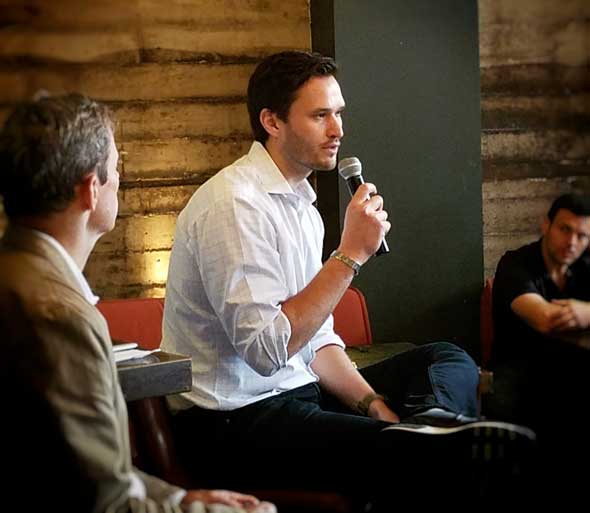
Jake Wood, Founder Team Rubicon
Jake Wood is a former college football player-turned Marine Corps sniper who co-founded a disaster relief organization- Team Rubicon - to help out in hurricanes, tornados, earthquakes and other natural catastrophes. Since 2010 Team Rubicon has provided emergency aid to 175 disaster areas, both domestic and overseas. But what makes them stand out is that almost all the 45,000 volunteers are military veterans, repurposing the skills they were taught in the US military to help in civilian life. Wood told his story to LAWAC over a Global Café Breakfast on Friday, Feb 10th.
Wood was a scholarship football player at the University of Wisconsin when 9/11 happened. He watched as war spread from Afghanistan to Iraq, and when Pat Tillman, a former linebacker for the Arizona Cardinals was killed after he enlisted, Wood himself took it as a wakeup call. He joined the Marine Corps, was deployed in Iraq and Afghanistan, and ended up as a Marine scout sniper.
The Marines train their snipers to hit a 10 inch disc reliably from 1,000 yards, but Wood says that is not the most important skill. “It actually isn’t that hard to shoot a target at 1,000 yards. But they don’t judge whether you can hit the mark, they judge your judgement and character.”
“At the end of the day I was trained to kill,” said Wood, “but you also learn a lot of skills that are transferable to any job such as planning, leadership skills, evaluating complex situations, and entrepreneurial skills.”
After returning from Afghanistan in 2009, Wood left the Marines and applied for business school, but when the Haiti earthquake happened in January 2010 he wanted to help. None of the established aid organizations were interested in hiring him, so he rounded up seven former Marine buddies, they stuffed backpacks with medical supplies, flew to the Dominican Republic and hiked their way into Haiti. More than 100,000 were dead, many more were injured and the infrastructure had completely broken down. But the Marines were able to give medical assistance to some of the worst injuries – amputees, people with cranial fractures or traumatic bleeding - very effectively in the midst of this chaos. It was not far removed from the war-ravaged chaos they had seen in Afghanistan and Iraq.
After Haiti Wood and his friends decided to found a relief organization, which they called Team Rubicon, which would use the wide range of skills of some of the 3 million US military veterans from the Afghanistan and Iraq wars to help people in natural disasters. “Vets have skills in engineering, medical aid, logistics, running organizations and managing people – often in very high-pressure situations.” These skills transfer directly into disaster relief. Wood had no idea how hard it would be to run a relief organization – they just forged ahead regardless. “Marines are too stupid to know when the possibility of failure is imminent,” said Wood. “The Marine Corps has the strongest organizational culture on the planet, so we took lessons from that on how you build a culture, how you build loyalty.” In seven years they grew from 8 guys to 45,000 volunteers, and to an annual budget of $16 m.
One of the hardest struggles for Team Rubicon was to be taken seriously by civilian relief organizations, many of whom would not instinctively see military veterans as natural partners. One breakthrough occurred during the aftermath of Hurricane Sandy which hit the East Coast in 2012. Team Rubicon was able to get emergency aid to people who were injured and in need very quickly, which earned them respect from other emergency medical providers. Internationally Team Rubicon’s relief work after the Nepal earthquake in 2015 really put them on the map. 9,000 died and some 22,000 people were injured by the quake, high in the Himalayas. Many of the more established relief organizations shipped in medical supplies and doctors and set up facilities in the capital, Kathmandu. “But there were many villagers at 12,000 feet and above in remote areas with no way to get to Kathmandu,” said Wood. “We sent out mobile teams, with rope skills to get past landslides, and used drones with thermal capability to evaluate villages [for survivors].” This made others in the NGO world take notice.
Since the Haiti earthquake, Team Rubicon has deployed its volunteers on over 175 operations including international operations in Pakistan, Chile, Burma, Sudan, Ecuador, Nepal, Greece, and Turkey. Domestically, Team Rubicon has responded to disasters such as Hurricane Matthew, Hurricane Irene, Tropical Storm Debby, Hurricane Isaac, Hurricane Sandy, and the tornado destruction of Moore, Oklahoma.
Team Rubicon has a double aim – to help victims of natural disasters, and indirectly to help the veterans themselves to readapt to civilian life. “We let these highly skilled people, whose skills were paid for by taxpayer money, essentially go to waste. Team Rubicon seeks to build out a framework that taps into that latent potential.”
Wood thinks that America hasn’t worked out how best to handle the many veterans returning from the Iraq and Afghan wars. He says we have “over-complicated and over-diagnosed” the issue of PTSD (post-traumatic stress disorder). “People are pitying these veterans and it causes them to get trapped in that way of thinking, that they are just someone to be pitied and not someone who can contribute.” He says the most important thing is not to find vets jobs or housing or education. “Before this we need to focus on reigniting the sense of purpose and community that they lose to a degree when they get out of the military. If they have that sense of purpose then they will be more prone to get and hold a job or receive an education. We shouldn’t pity veterans. Most of them are coming back stronger than when they left. They can become whatever we need them to be.”
